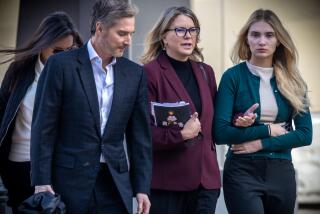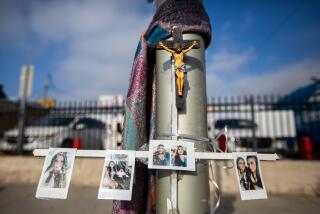Secrecy Envelops Tillman Proceedings
- Share via
No testimony was heard in the murder trial of Henry Tillman on Wednesday as developments in the case were shrouded in secrecy and conducted behind the closed doors of the judge’s chambers.
Lawyers spent most of the morning and part of the afternoon huddled in the chambers of Judge Steven C. Suzukawa, who postponed the trial until Monday. No reason was given and the judge told lawyers not to make any statements.
Legal analyst Laurie Levenson, an associate dean at Loyola Law School, said off-the-record conferences in chambers usually are held under limited circumstances, such as plea negotiations, discussions of investigations and reports of witness intimidation or jury tampering.
Tillman, the 1984 Olympic heavyweight boxing gold medalist, is charged with murder and attempted murder in connection with a Jan. 10, 1996 shooting outside the Townhouse nightclub near Los Angeles International Airport. According to witnesses, a large man walked over to the victims’ parked Lincoln Continental, fired a .38-caliber revolver, then chased the car as it sped away, firing a second burst of bullets.
The driver, Leon Milton, was shot in the chest but recovered. His passenger, Kevin Anderson, was shot in the eye and died from a stroke two days after the shooting.
Two eyewitnesses have recanted earlier statements, denying on the witness stand that they heard shots or saw Tillman at a Westchester nightclub on the night of the shooting. A third witness, who had recanted at a preliminary hearing, changed her testimony and identified Tillman as the shooter.
This week, as prosecutors neared the end of their case, jurors have spent more time outside the courtroom than hearing testimony.
Suzukawa said the delays were necessary.
The judge and lawyers have talked in private extensively, even when the jurors are not in the courtroom.
Attorney Douglas E. Mirell, who specializes in media access issues, said current case law dictates that lawyers and judges should publicly discuss “anything substantive.”
In July, the California Supreme Court determined that the press and public should be denied access to courtroom proceedings only after a hearing to decide whether closure is justified.
More to Read
Sign up for Essential California
The most important California stories and recommendations in your inbox every morning.
You may occasionally receive promotional content from the Los Angeles Times.













